Amanda Geroy-Profile
Guru Brahma Guru Vishnu Guru Deva Maheshwara Guru Sakshat Parambrahma Tasmai Sri Gurave Namaha
Amanda is a devotee whose love for God finds expression in Odissi dance. While dancing, she comes before God with an offering of her body, mind, and heart.
Amanda has been a life-long artist. Excelling since childhood at visual arts, drama and dance, Amanda began her performing career at the age of six. She was involved in theater for many years and received a bachelor’s degree in theater from Northwestern University in Chicago where she also majored in Russian language and literature. She has performed throughout the U.S. in cities such as Nashville, Detroit, Chicago, San Francisco, Santa Fe and Off-Broadway in New York. She has received scholarships and honors for her excellence in theater and academics and was given the opportunity to study in Russia for eight months.
When she came to San Francisco, California in 1999, Amanda met her first Odissi guru, Guru Jyoti Rout. In Odissi Amanda found a perfect blend of devotion and artistry and she began immediately to devote herself whole-heartedly to studying the art form. In 2000 Amanda spent six months intensively studying in India under the direction of Guru Jyoti Rout and Guru Padma Charan Dehury. During that time Amanda also studied Odissi mardala drum and Oriya language and immersed herself in Oriya culture. Amanda followed up with a second trip to India in 2001 for two months. Amanda finally shifted to India on a long-term basis in December of 2006. Since that time she has been living in Orissa and training under the guidance of Srimati Sujata Mohapatra at Srjan, Bhubaneswar. She also currently studies mardala under eminent guru Banamali Maharana.
Amanda feels quite fortunate to have studied under two Odissi gurus who hail from different gharanas and who specialize in different aspects of the dance form. Guru Jyoti Rout is a master of abhinaya and a prolific choreographer. During the seven years under her tutelage, Amanda learned the subtle art of expression and gained her regard for dance as an act of devotional worship. In Srimati Sujata Mohapatra, Amanda finds the embodiment of dedication to the art form of Odissi, expressed in an unparalleled perfection of technique and a total union of life and art. Smt. Mohapatra's rigorous training standard and strict adherence to the perfection of her Guru’s style have enabled Amanda to open up to the very essence of Odissi with all of its nuances.
In America Amanda has had a prolific Odissi performing career. Productions with Jyoti Kala Mandir Performing Company include Sri Jagannath-2000, Buddha-2002, Konark-2003, Cosmic Dance-2004, Amrit Dhara-2005, and Avatar-2006. She had her solo debut or Ranga Puja performance in San Francisco in 2004 and other major solo performances in Phoenix, Atlanta, Santa Fe, Taos, San Jose and at the San Francisco Ethnic Dance Festival in 2005 and 2006. In addition to being a dancer, Amanda has written and narrated English scripts for numerous Odissi performances and was a teacher of Odissi and drama to children and adults.
Amanda made her India performing debut in 2006 at the 3rd International Odissi Festival in Bhubaneswar where she received critical acclaim for her portrayal of the character Hanuman. She continues to perform at festivals of classical dance throughout India.
Amanda firmly believes that in order to portray the subtleties of abhinaya in Odissi with authenticity and spontaneity it is necessary to spend enough time in the Oriya culture to understand the Oriya mind, heart, way of living, and most essentially the Oriya belief system, which is epitomized in the worship of Lord Jagannath. To this end, she continues to be based in Orissa where she can practice speaking Oriya and continue her sadhana in the company of the many wonderful Odissi dancers and musicians who make Orissa their home.
In her home country of America, Amanda has always aspired to touch the hearts of people from all walks of life, backgrounds and languages with the beauty and spiritual depth of Odissi. She truly believes that at the core all humans are one and that God is one. When an artist is able to touch that universal God through his or her art, all spectators become spellbound, all are uplifted and all find their own link to the great Oneness which is beyond the boundaries of name and form. It is Amanda’s heartfelt wish that all beings connect in whatever way to that One which is the source of peace and universal love.
Amanda Geroy,
Odissi Dancer ● Theater Artist
E-mail: amanda.geroy@gmail.com
“[At the 3rd International Odissi Festival in Bhubaneshwar] Of the dancers based abroad, Jyoti Rout’s disciple Amanda Geroy’s physical agility and bhava in Sankatvimochan Hanuman impressed.”
Leela Venkataraman
The Hindu, January 5, 2007
"At the 3rd annual Devdasi national dance festival hosted recently at Rabindra Mandap in Bhubaneswar, the amazing and intense abhinaya of American dancer Amanda Geroy (disciple of Sujata Mohapatra) left the audience spellbound."
The Hindu, October 24, 2008
“As the dancer got onto the stage and depicted the devotional character of Hanuman, at the 3rd International Odissi Festival in Bhubaneshwar, the huge audience refused to believe that the performer was a foreigner. Such was her intensity, involvement and perfection in portrayal of the character. And that was the distinct debut for Amanda Geroy, the American theatre actress turned Odissi dancer who is now based in Bhubaneswar.”
The Hindu, June 13, 2008
“It was an exciting experience for the audience to witness ‘Shiva Tandav’ - a duet dance recital by Amanda from the US and Maria from Peru both of whom are being trained at the city-based Guru Kelucharan Mohapatra’s Srjan dance institution. Incredible was Amanda’s exhibition of command over an oriental dance form and understanding of a mythological character like Lord Shiva.”
New Indian Express, May 16, 2008
“Amanda Geory from USA groomed at Srjan, showed complete dedication to the dance form through her performance. It is amazing to see a dancer of non-Indian origin, practicing Indian forms with complete austerity.”
Narthaki, January 28, 2008
“Amanda Geroy from California’s portrayal of the character of Hanuman left the audience spellbound.”
The Hindu, December 31, 2006
Major Odissi Performances
Solo
Apr, 2011 Unbound Beats, Ranjana Gauhar's Fest, New Delhi
Jan, 2011 Pragyoti Festival, Guwahati, Assam
Dec, 2010 National Odissi Festival, Bbsr, Orissa
Dec, 2010 1st Odissi Intl. Festival, Bbsr, Orissa
June, 2010, Guru Dakshina Utsav, Bbsr, Orissa
Sept, 2009 Int'l Theater Olympiad, KVK, Cuttack, Orissa
July, 2009 Raseswar Saikhia Award, Guwahati, Assam
June, 2009 Ekamra Utsav, Bbsr, Orissa
Feb, 2009 Neem Karoli Baba Ashram, Taos, USA
Nov, 2008 Shinjan Nrityalaya Festival, Kolkata
Sept, 2008 3rd National Devadasi Festival, Bbsr, Orissa
March, 2008 Neem Karoli Baba Ashram, Vrindavan, UP
March, 2008 Temple Dance Festival, Pushkar, Rajasthan
December, 2007 National Odissi Festival, Bbsr, Orissa
September, 2007 Rani Mandir, Rishikesh, Uttaranchal
June, 2007 Annapurna Theater, Puri, Orissa
December, 2006 3rd Int'l Odissi Festival, Bbsr, Orissa
July, 2006 Hindu Temple, Atlanta, USA
June, 2006 San Francisco Ethnic Dance Festival, USA
May, 2006 Lahar, touring, USA
September, 2005 Festival of India, Phoenix, USA
June, 2005 Lahar, touring, USA
June 2005 San Francisco Ethnic Dance Festival, USA
October, 2004 Mission Cultural Cntr, San Francisco, USA
July, 2001 Anglada’s Auditorium, Taos, USA
July, 2001 The Railyard, Santa Fe, USA
Group
June, 2010, Srjan troupe, KVK, Cuttack, Orissa
Dec, 2009 ICCR Tour with Sujata Mohapatra, USA
Jan, 2009 Sri, Menaka Thakkar Dance Co., Toronto, Canada
March, 2006 Amrit Dhara, touring, USA
April, 2005 Avatar, touring, USA
September, 2004 The Cosmic Dance, touring, USA
April, 2003 Konark, touring, USA
April, 2002 Buddha, touring, USA
November, 2000 Prem, Rabindra Mandap, Bbsr, Orissa
October, 2000 Great America, California, USA
March, 2000 Sri Jagannath, touring, USA
Tuesday, October 18, 2011
Interview with Amanda Geroy in "Weekend Chronicle"
WC: Tell us something about yourself?
I was born in the USA and I am the only child of my parents. My mother is a librarian and my father is a professor, so I always loved to read and study. Though neither of my parents are artists, they always encouraged me to be creative. Since childhood I have loved drawing, painting, dancing and acting. My mother is also a very devotional person. We spent a lot of time at the Neem Karoli Baba Ashram and Hanuman Temple in New Mexico. My mom has also studied Hindustani vocal music and has travelled several times to India, so I was exposed at an early age to Indian culture and philosophy. I went on to get a degree in theater from Northwestern University in Chicago and after that moved to San Francisco where I started learning Odissi.
WC: Where were you first exposed to dancing?
I always loved to dance. When I was a kid I started acting on stage at the age of seven. I loved to perform and my friends and I would stage productions and dance contests all the time. I had some formal training in ballet, but only started seriously training in dance when I got interested in Odissi. My first Odissi teacher was Guru Jyoti Rout with whom I studied for seven years in San Francisco. After that I felt that it was time to deepen my study of Odissi by learning in India. When I took a workshop in San Francisco with Smt. Sujata Mohapatra I immediately understood that I could learn a lot from her and I had so much respect for her and for the technique of Guru Kelucharan Mohapatra. I was fortunate enough to be able to leave everything and come to Orissa in December, 2006 and I have stayed here ever since.
WC: What made you choose this Indian Classical Dance form (ODISSI)?
Indian classical dance is different than western classical dance like ballet because in Indian performing arts there is no separation between the art forms of drama and dance. Because I have a theatrical background I love to tell stories by enacting different characters. I also love the richness of the Indian mythological stories and the depth of Indian philosophy. I found in Odissi the perfect blend of performing art and bhakti.
WC: Which act/part in ODISSI you love the most?
When I dance I am striving for perfection in my art form as well as participating in a ritual of devotion. I find this to be a very unique and rewarding approach to art. The practice of Indian classical art can bring about deep spiritual growth and transformation on the part of the practitioner. This happens on many levels-through our interaction with our teacher, through offering seva to the divine in the form of dance, through communing with the characters from Indian mythology and through teaching and performing as forms of service to humanity. Anything that one does with the spirit of service and surrender becomes an act of worship. I feel that I am meant to do Odissi and that it is my path for spiritual growth in this life.
WC: What was your family’s reaction?
My family is very supportive.
WC: What does dance mean to you?
It is a path which takes me beyond myself, which allows me to merge myself in rhythm, in bhava, in tune, in sensation, in character. It is a path of freedom through discipline and surrender through hard work.
WC: According to you, what are the greatest criteria to be a good dancer?
My teacher, Smt. Sujata Mohapatra, always says that the most important qualities for a dancer are 3 D’s: Dedication, Determination and Devotion, and 3 P’s: Patience, Practice, and Perseverance. I agree with her totally. I am constantly being reminded to surrender which is very difficult and very rewarding.
WC: Is dance and spiritualism/divinity inter-connected?
Definitely. I think that spirituality and divinity are everywhere and in everything. I definitely try to bring that awareness into my practice.
WC: Tell us something about your childhood?
We moved several times when I was growing up, and luckily the places we lived were very beautiful. When we lived near the ocean in California I used to play in the waves for hours. The sea there is cold and I would be shivering but I never wanted to leave. We also lived in the mountains and I used to love to go snow skiing in the winter and hiking in the summer. There were beautiful views from the mountain tops.
WC: What are some of your earliest childhood memories?
My whole family loves nature a lot and we used to go camping often in the woods. I remember I used to talk to trees when I was very small. I don’t remember what they answered back though….
WC: What was the greatest joy or sadness of your childhood?
I’ll never forget my first role in a play. I was the youngest cast member-age seven. I came in at the end of the play and it was supposed to be a very dramatic moment. I was supposed to give hope to the people in their time of troubles. One day I decided for some reason to play it as a comedy. The whole audience was laughing and I was so proud of myself. When I went backstage I thought the director would praise me. Instead I got an earful of abuse. I guess that was not what she had intended for the role…
WC: Who were your childhood role models?
Actually, as a child I loved Madonna. I used to choreograph a lot of dances to her songs. My father is also one of my role models. He is a perfectionist in everything that he does. When I was younger I didn’t necessarily appreciate his perfectionism, but now I do.
WC: As a dancer what is your greatest expectation?
I don’t really have any expectations. I want to come as close as I can to touching the essence of this art form. I would like to lose myself completely in it, even for a moment. When I think of what the great master dancers like Guru Kelucharan Mohapatra and Smt. Sanjukta Panigrahi achieved, I feel that there is so much depth and power in this art. They were in total communion while dancing. To experience that type of communion would be nirvana for me.
WC: Tell us about your experiences while performing in India and that of North East India (Guwahati)?
I am really lucky to have had great support and encouragement from my teacher Smt. Sujata Mohapatra to perform in several festivals in India. Every time I perform I learn a lot. I appreciate the feedback I get from audience members who have seen a lot of Indian classical dance. People are really supportive and give me good commentary and encouragement. I have performed twice in Guwahati, once at a festival organized by Samar and Anita Sharma who are great supporters of Guru Kelucharan Mohapatra and Smt. Sujata Mohapatra and once recently at a festival organized by Anwesha Mohanty. I met a lot of great dancers there and everything was very nicely organized. On both of my trips I got to see Shatriya dance which I find very beautiful and graceful. It has a humility, dignity and devotional quality which I love. I also love the Shatriya music and the drumming. It creates a very peaceful atmosphere. If I come to Guwahati again I would love to visit the Shatriya monasteries.
WC: Did you taste the local cuisines out here?
I got to eat some momos which I liked a lot! I was also gifted a mekla chadhar which is very beautiful.
WC: Choreography or expression, which is more important in dance?
Both are very important. My teacher always says that dance is a language of the body. We can’t rely on the face alone to show a character or tell a story. We need mime, the vocabulary of gesture, facial expression, body stance and a very strong command over dance technique in order for the beauty of the dance form and the choreography to come out. We also have to know at which point in the dance it is more important to highlight one aspect or the other.
WC: Back in United States, what is the people’s take on Indian Dance form and especially ODISSI?
It is most popular among the Indian community in the US. Many other people have never seen Odissi before. But those who see it are often fascinated by it. Audiences need to slowly become more educated about the aesthetics and the content of Odissi so that they can better judge the quality of Odissi performances and also follow the storylines. I think Odissi has a lot of power and beauty which is universal. The more people see it, the more popular it will become.
WC: Describe yourself in one word or term?
A student
WC: What’s your take on love and devotion?
Love is the manifestation of God on earth. Loving and being loved is God’s gift to human beings. Universal love for all of creation is the ultimate goal. Mythology is filled with examples of love and devotion which are beautiful beyond words-the magnificent devotion of Lord Hanuman for Lord Ram and their beautiful relationship, the unconditional prem, surrender and bhakti of the gopis for Lord Krishna and many more. I draw a lot of inspiration from these stories.
WC: The place where you are presently staying, tell us about that place?
I stay in Bhubaneswar and attend dance classes at Srjan Guru Kelucharan Mohapatra Odissi Nrtyabasa under Smt. Sujata Mohapatra and mardala classes at Mardala Academy under Guru Banamali Maharana
WC: Your take on India
It is the seat of many spiritual riches and the birthplace of many great human beings. I hope that the wealth of indigenous cultures and the values of simple living and high thinking continue to be cherished as India moves into the future.
WC: Is Indian classical dance losing its old charm? Your opinion.
It is definitely evolving, but evolution is a natural and healthy process. It is no longer being performed by traditional families in the temples but by a worldwide network of artists on concert stages. It must necessarily go through some changes. I hope that it always retains its regional essence and its power of devotion. If dancers have the patience for long, hard training and the traditional system of learning is maintained, then hopefully there will continue to be brilliant performers for generations to come.
WC: Is dancing your profession or passion?
Both
WC: About your family and friends and their say on your choice of dance.
They all appreciate Odissi very much.
WC: INDIAN CLASSICAL DANCE or WESTERN HIP HOP and SALSA…. Your preference.
Everything has its place and time. All dance forms are natural human expressions coming from a particular place and a particular people with a particular rhythm. I personally practice Indian classical dance but I don’t want to say what is right for anyone else. However, I will end by saying that Indian classical dance is unique because it takes many years of hard work to master and it also takes some effort to appreciate. So, if you don’t understand it right away, take some time to try to understand it and give it a chance to work its magic on you.


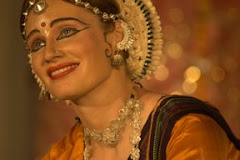


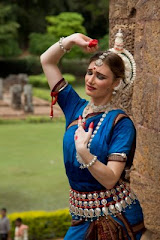

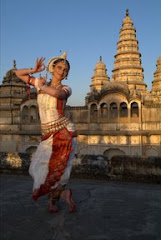

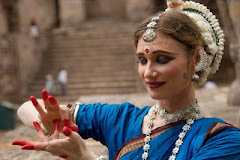

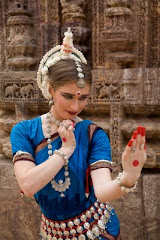

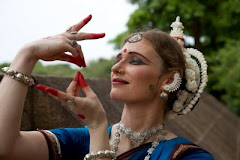
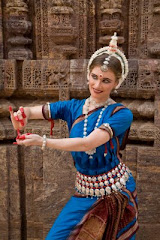
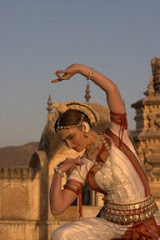
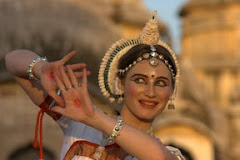
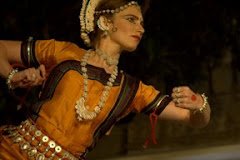

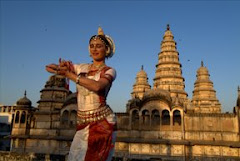
No comments:
Post a Comment